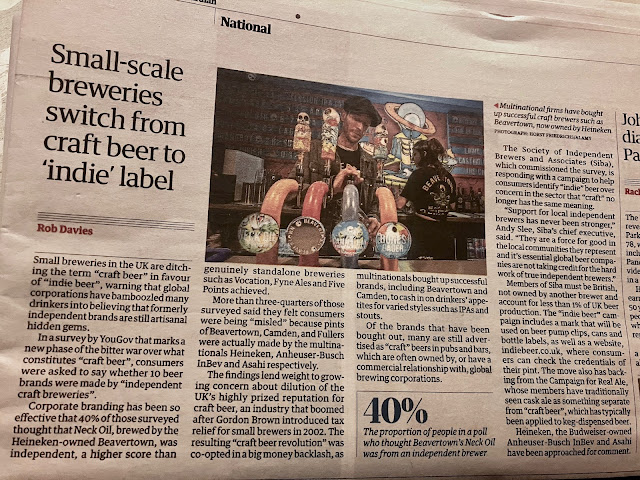How Small?
I'm backgrounding the Kertész piece again today as Jane suggested something else dear to my heart: beer. In yesterday's Guardian they ran a piece on an emerging trend: the takeover of 'craft' brewers and their products by large brewco's, which then continue to trade on the 'small brewer' image that the original brewers had as their USP and which obviously colours the consumers' choice in choosing their particular tipple. Brands such as Beavertown and Camden are set up now in direct competition with still genuinely independent breweries which operate on a very small scale and really can't operate at anything near the same commercial level as the giants with their enormously deep pockets, making the smaller fry yet more targets for the big fish to sweep up. One thing made me sit up in surprise in reading the piece was the revelation that Fuller's, that venerable old London brand, home to London Pride and ESB: two of the finest ales out there, is actually now owned by Asahi, the giant Japanese outfit.
However, there are still plenty of smaller producers of fine ales out in the wild and The Society of Independent Brewers and Associates is aiming to codify the status of small brewer, so that consumers can make more informed decisions about their products of choice. They are a membership-based society with some basic rules for accreditation: the company must be British-owned, and genuinely small: less than 1% of UK beer production. They're reframing the sector as 'Indie', to distinguish it from the now bastardised 'craft' image, and there will be appropriate brand marking to suit. Their website is here, where you can buy indie beers online.
February next, though, I'll be making a pilgrimage to my favourite indie brewer: The White Horse Inn at Clun [blog posts passim]; as we're heading down to Shropshire for an arts festival there. I look forward to one of the finest pints of draught pale ale known to man, and which serves as an example that many emerging small brewers would do well to heed. Don't over-hop every damned beer you make: a few more traditional ales would be a welcome contrast to some of the current crop of over-astringent and frankly far too strong brews. There is such a thing a session beer: something that can be drunk in quantities that doesn't quickly become a suicide mission! Just a suggestion...




Comments
Post a Comment